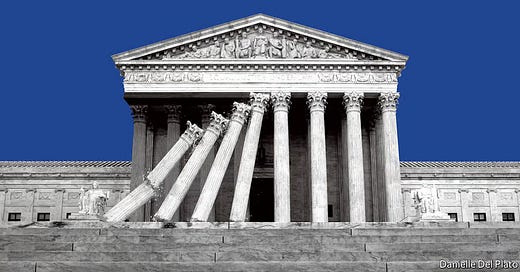Bonus 85: Bury the Court or Praise It?
Reflections on whether Supreme Court reform should aim to diminish the Court's power, to shore it up by making the Court more accountable, or some combination of both.
Welcome back to the weekly bonus content for “One First.” Although Monday’s regular newsletter will remain free for as long as I’m able to do this, much of the bonus content is behind a paywall as an added incentive for those who are willing and able to support the work that goes into putting this newsletter together every week. I’m grateful to those of you who are already paid subscribers, and hope that those of you who aren’t will consider a paid subscription if and when your circumstances permit:
Even though there are a whole bunch of major rulings coming in the next eight days (starting later this morning at 10 ET), I wanted to use today’s bonus issue to take a slightly longer view—prompted by various discussions in recent weeks, public and otherwise, about prospects for Supreme Court reform. It seems increasingly clear to me that, among the Court’s critics, two distinct camps are emerging: In one camp are those who look at recent events as evidence that the Court, as an institution, has far too much power and sway over our lives—and who view the goal of reforms as reducing the Court’s power vis-à-vis the other institutions of American government. For some, that’s an end unto itself. For others, it reflects the view that those other institutions, once unencumbered by the Court, will be better situated to achieve the policy goals of those pushing for such reforms. Whatever the ends, though, the means are the same.
The other camp, in contrast, sees the problems surrounding the current Court as not just fixable, but worth fixing—on the view that, whether or not a more popular/credible Court is a better vehicle for achieving specific policy goals (probably not), it’s better for our constitutional system in the medium and long term than any of the alternatives. And although there’s a lot that these two camps have in common (including disdain for much that the current Court is doing), serious reform conversations are likely to increasingly divide them. Thus, to borrow from Mark Antony’s funeral oration for Julius Caesar (or, at least, Shakespeare’s version), the question is whether we come to bury the Court or to praise it.
Regular readers of this newsletter will not be the least-bit surprised to discover that I fall solidly into the latter camp. But I thought it might be worthwhile to say a bit about why, and I endeavor to do so below the fold.
For those who are not paid subscribers, the next free installment of the newsletter will drop on Monday morning. For those who are, please read on.
Keep reading with a 7-day free trial
Subscribe to One First to keep reading this post and get 7 days of free access to the full post archives.




